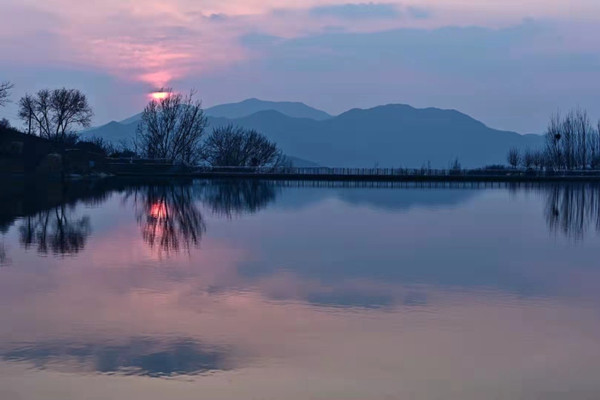Porters see a steep drop on Taishan Mountain
Numbers have dwindled since the 1990s, and a new aerial cargo ropeway has cut prices. Ju Chuanjiang and Zhao Ruixue report from Tai'an, Shandong.
The 18 Bends is the name given to the final stretch of the winding 6,800-step pathway that leads to the top of Taishan Mountain in Shandong province. Rising by 400 meters over 1 kilometer, most people who make it are usually too exhausted to enjoy the stunning views at the top.
Yet while tourists who attempt the hike can regularly stop and take a rest along the way, the porters who daily carry heavy loads up the mountain on wooden poles over their shoulder never do, come hail or shine.
According to The Porters of Taishan Mountain, a piece of prose that first appeared in primary school textbooks in the early 1980s, these human "beasts of burden" were legion three decades ago. Today, however, the number has dwindled to fewer than 40.
"In 2000, my team had more than 300 men, but now we have only a dozen," said Zhao Pingjiang, who leads the last team of porters based on the mountain. The others who still do the job live in nearby towns.
Zhao attributes the drop in porters to an aerial ropeway opened in 2013 that stretches 2,190 meters between Taohuayuan, a scenic spot to the west of the mountain, to Tianjie Street near the summit. The mechanism has five containers, with each able to carry a load of up to 400 kilograms.
Porters charge according to distance and weight of their cargo, with 50 kg costing from 24 to 34 yuan ($3.50 to $5) for a short journey. Customers who use the ropeway, which is operated by a company affiliated with the scenic area's management committee, pay a flat fee of just 0.3 yuan per kg.
"In the 1990s, I used to be concerned with how to provide enough accommodation for all our porters," said Zhao, who has led his team for 30 years. "Now, I spend my time thinking how I can improve their basic living conditions."
As new buildings are not allowed on the mountain, the porters live in a collection of makeshift shelters made of stone and plastic that have been erected in a clearing surrounded by trees.
Most of the team are in their 40s, with the youngest 39. Zhang Hongping, 60, is the eldest member, and shares a stuffy 3-square-meter hut.
"Almost every porter has some physical problems," he said, explaining that he has osteoarthritis. He added that he drinks alcohol every day, largely for the pain, but also because life on the mountain can be boring.
Zhang stands at 1.7 meters and is stick thin, yet he said he can still carry 40 kg of cargo from the middle of the mountain to the top within three hours. The pride he takes in his job is obvious.
"The cargo carried on the aerial ropeway, such as materials for repairing roads or the mountains's ancient structures, used to be shouldered by us," he said. "I hope to keep working as a porter for as long as I can."
Zhao said porters will not be entirely phased out, as they are able to deliver goods to individual stores on the mountain, which the ropeway cannot do. "Also, the ropeway can only carry its maximum amount. Heavier cargo that can't be split up will need to be carried by porters," he added.
Royal ascent
Taishan Mountain, which stands 1,545 meters above sea level near the east coast, is by no means China's highest peak, but it is the first to greet the sunrise. For this reason, its summit was regarded in ancient times as the closest spot to the sky.
Over a period of more than 2,000 years, 12 Chinese emperors - starting with Qin Shihuang, the first emperor, who unified China in 221 BC - made pilgrimages to the mountain to pray to the gods, according to information provided by the scenic area's management committee. This marked the birth of mountain porters.
"It's recorded that the belongings of ancient emperors, and their offerings to the gods, were carried up the mountain by local workers," said Chen Guangwu, 75, who lives in Dajinkou, a town in the northeastern part of the Taishan Mountain range that many emperors are believed to have passed through.
"Porters have played a very important role in the mountain's development," said Chen, who worked as a porter in the 1970s and '80s. "What we've done over the years has made visiting the mountain so much easier for tourists."
Chen helped carry materials to build a passenger ropeway on the mountain, the first of its kind in China, in 1982. Some of the wheels for the mechanism were 2.8 meters in diameter and weighed more than 4 metric tons.
As the wind was too strong for helicopters to transport them, the wheels were carried by porters using a purpose-built frame, he said, adding: "It took more than 30 men to transport each one, and the largest wheel took us four days."
Few people in Dajinkou still work as porters, and those who do mainly carry their own products, such as bean curd, to stores catering to tourists and residents living on the mountain.




 Shandong: Where Excellence is made
Shandong: Where Excellence is made Building a Moderately Prosperous Society: The Tai'an Way
Building a Moderately Prosperous Society: The Tai'an Way Video: Jiunvfeng Park
Video: Jiunvfeng Park

